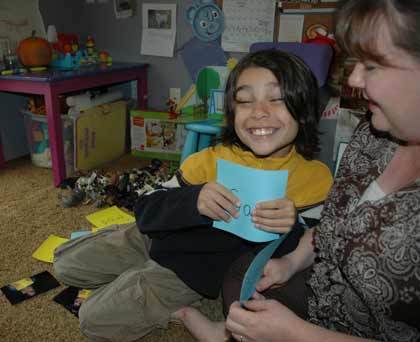At 2 years of age, Lucas Vanderhoof was diagnosed as severely autistic.
As he grew, he learned skills, but made no eye contact with people, even his parents Luzmary and Adam, and his speech was limited.
“He came a long way,” Luzmary said of her son who turns 9 soon. “But he was still in his own world. He could dress himself and he would speak, but he couldn’t relate to people.”
Ten months ago, with no connection to their son, Adam and Luzmary believed their son’s progress was a dead end.
“I felt like I was raising a robot,” Luzmary said. “He was someone who could do a lot of things, but wasn’t present.”
One day, Luzmary was visiting with a friend whose son is autistic. She noticed changes in him right away. Her friend introduced her to an alternative autism treatement program, The Son-Rise Program.
Since 1983, the Autism Treatment Center of America has provided innovative training programs for parents and professionals caring for children challenged by autism. The Son-Rise Program teaches a specific and comprehensive system of treatment and education designed to help families and caregivers enable their children to dramatically improve in all areas of learning, development, communication and skill acquisition. It offers effective educational techniques, strategies and principles for designing, implementing and maintaining a stimulating, high-energy, one-on-one, home-based, child-centered program.
Luzmary knows some don’t put much merit into the program, but for their family it’s been a godsend.
The Son-Rise Program has helped Lucas better understand his feelings. He’s become interested in other people and is now interested in conversation with others.
“I can call him from across the room and he looks at me and says, ‘yes Mom,’” Luzmary said. “That’s huge.”
The real revelation came when Lucas recognized them as Mom and Dad, not just titles, but special people.
“It was a miracle,” Luzmary said. “It’s something we’ve been waiting for for eight years.”
The key, Luzmary said, was joining Lucas’ world.
“The core of autism is the inability to relate,” she said.
Lucas would escape this world in several ways, one was to beat his chest. During the first week of training, LuzMary said, Lucas started beating his chest. Rather than correct him, she joined him, striking her fists to her own chest.
“For 20 minutes we played, pretending we were gorillas in the jungle,” she said. “When I joined his world, he felt safe enough to join my world.”
She said he’s never pounded again.
“We’re selling him the human race,” she said. “Teaching him the pleasure is not in the activity or the object, but in the people involved. It has more to do with us than him. We have to model the human race. We have to model love and acceptance.”
For the past 10 months, that’s what Luzmary and Adam have been doing. They’ve attended training. They have four trained volunteers who spend four hours a week at their home working with Lucas. Luzmary puts in another 20 to 24 hours a week with her son, and Adam takes over on weekends continuing the training.
They are learning to be his experts.
But it all costs money. Autism treatment is rarely covered by insurance, they say, and they’ve exhausted their resources, but they have one big push they want to make with the program.
“He’s come this far we want to go all the way,” Luzmary said.
“We’ve come to a place where we’re asking for help,” she said. “We’ve exhausted our resources.”
Friends and family are helping out by hosting a fundraising pasta feed and silent auction from 11 a.m. to 2 p.m. Nov. 15 at the Enumclaw Seventh-day Adventist Church, 3333 Griffin Ave. Donations are $7 to $10 per person or $25 for a family of five. Tickets are available at the door. Presale tickets are available through Luzmary at 360-802-1511 or Denise at 360-802-9778.
They’re hoping to raise $30,000 for a two-day outreach with a Son-Rise teacher at their home in December to further train them for Lucas’ specific needs and a week to the Autism Treatment Center of America in Sheffield, Mass., where a team of facilitators and Son-Rise teachers will work one-on-one with Lucas eight hours a day while also working with his parents to get the most out of the home-based program.
Lucas still checks out, but for much shorter periods. He interacts with his younger sisters and others. He isn’t cured, but that’s not what Luzmary and Adam are expecting.
“It’s about how well he can love and be loved,” LuzMary said.
“He uses language, but now it’s relational,” she said.
“We don’t have fears and worries about the future,” she said. “Nothing has brought us this much hope or freedom from the autism.”



